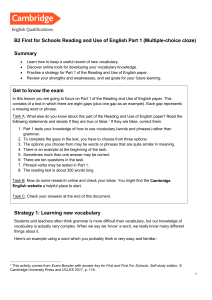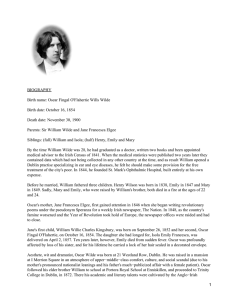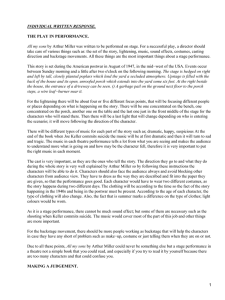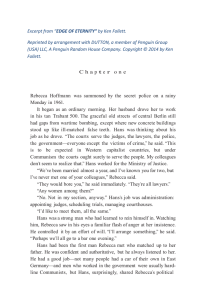The Devoted Friend; Oscar Wilde
Anuncio
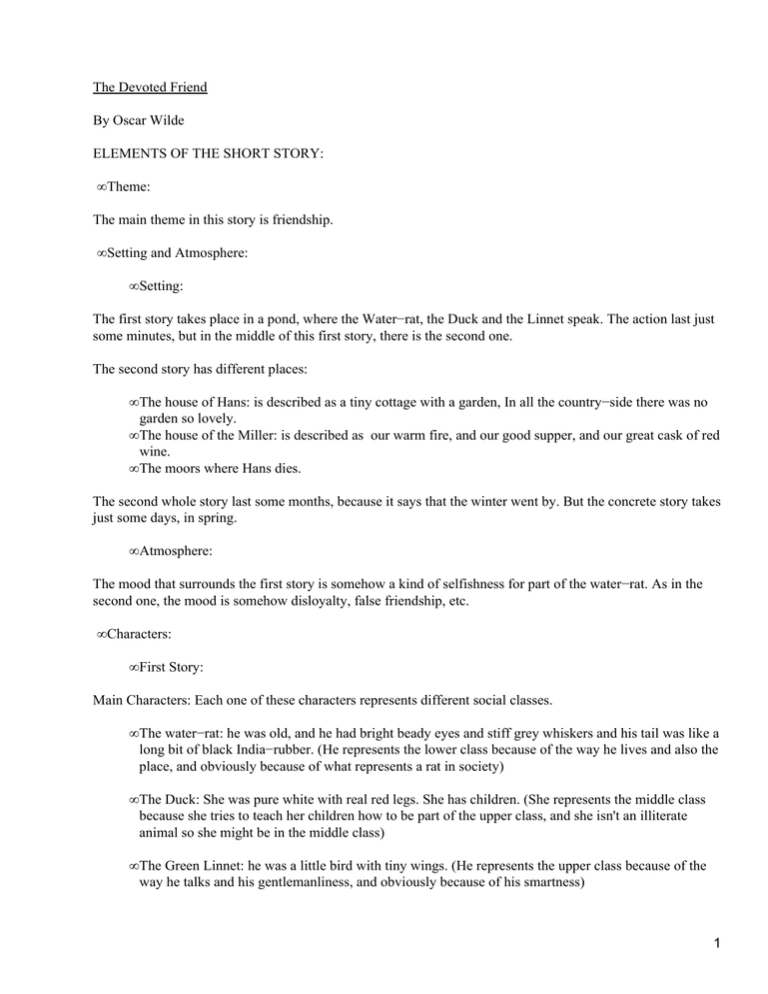
The Devoted Friend By Oscar Wilde ELEMENTS OF THE SHORT STORY: • Theme: The main theme in this story is friendship. • Setting and Atmosphere: • Setting: The first story takes place in a pond, where the Water−rat, the Duck and the Linnet speak. The action last just some minutes, but in the middle of this first story, there is the second one. The second story has different places: • The house of Hans: is described as a tiny cottage with a garden, In all the country−side there was no garden so lovely. • The house of the Miller: is described as our warm fire, and our good supper, and our great cask of red wine. • The moors where Hans dies. The second whole story last some months, because it says that the winter went by. But the concrete story takes just some days, in spring. • Atmosphere: The mood that surrounds the first story is somehow a kind of selfishness for part of the water−rat. As in the second one, the mood is somehow disloyalty, false friendship, etc. • Characters: • First Story: Main Characters: Each one of these characters represents different social classes. • The water−rat: he was old, and he had bright beady eyes and stiff grey whiskers and his tail was like a long bit of black India−rubber. (He represents the lower class because of the way he lives and also the place, and obviously because of what represents a rat in society) • The Duck: She was pure white with real red legs. She has children. (She represents the middle class because she tries to teach her children how to be part of the upper class, and she isn't an illiterate animal so she might be in the middle class) • The Green Linnet: he was a little bird with tiny wings. (He represents the upper class because of the way he talks and his gentlemanliness, and obviously because of his smartness) 1 Secondary Characters: • The little Ducks: they look jus like a lot of yellow canaries. • Second Story (the devoted friend itself): Main Characters: • Hans: He is an honest little fellow. He has a kind heart and a funny round good−humoured face. He really practices friendship. He loves his garden, but his friendship with the Miller is above all. He is very popular, but when he needs them, they don't help him. Sometimes, especially in winters he feels very lonely because of his lack of real friends. • Hugh the Miller: He says a lot of beautiful things about friendship but he doesn't practice it. He could represent the middle class. Secondary Characters: • The Miller's Wife: She always supports her husband in everything he does. No matter if is something bad or good. She always says that her husband is the best friend in the whole world and the most generous man. • The Miller's Son: He seems to be more generous and kindhearted because he is the only one who asks why they (the millers) don't invite Hans to be with them during the winter. Even though, their father says that it was a bad idea because Hans could get envious. • The Doctor: He is the one that is going to heal the Miller's son. • The Blacksmith: He starts the conversation after Hans funeral, saying that Hans is a great loss. • Plot: • First Story: • Conflict: The story starts in a pond, where some little ducks were swimming. Their mother, the Duck, was telling them that they would not be in the best society unless they could stand on their heads, but the little ducks did not pay attention. The Water−rat said that they were very disobedient, and the Duck told him that parents should be patient with children. The Water−rat answered that he had no children, that he wan not even married, he preferred friendship than love. A Green Linnet that was there, asked what the duties of a devoted friend were, and started to tell the story of The Devoted Friend. • Sequence of actions: At the middle of the second story, which was being told by the Linnet, the water−rat interrupted because he thought it was the end of the story. The Linnet answered to him, that it was the beginning. • Outcome: The Water−rat did not understand the story and he did not like that the story had a moral, so he went back to his hole. The Linnet asked to the Duck what she thought about the story, and the Duck said that it is very 2 dangerous to tell a story with a moral. At the end, the author speaks himself and says that he agrees with her. • Second Story (the devoted friend itself): • Conflict: Once upon a time, there was an honest little fellow named Hans. He was a man with a kind heart. He lived in a tiny cottage alone and everyday he worked in his garden. Hans had many friends, but the best one was Hugh the Miller. Hugh the Miller always went to Hans's house in order to recollect flowers for himself. • Sequence of actions: • Hugh the Miller always talked about how important is friendship and to share everything with one's friends, but he never gave anything to Hans. • Hans always worked in his garden, but in winter he felt lonely and lived in bad conditions because of the cold weather, and because anyone visited him. • Hugh waited the spring to go to see Hans in order to recollect flowers such as primroses. • When Hugh arrived at Hans' house, Hans told him that he would bring all the primroses into the market and sell them to buy back his wheelbarrow, because throughout the winter he had to sell it, because he needed the money to eat. • The Miller told Hans that he would give him his wheelbarrow, although it was not in good repair, because of that he boasted about being generous. However, the in fact, he would give it to him because he had a new one for himself. • Hans said that he could repair the wheelbarrow because he had a plank of wood. When Hugh listened to him, he asked Hans to give him the plank of wood because he needed it, and he told Hans that he should give him that because he was going to give him the wheelbarrow. • The Miller also asked Hans to give him some flowers because he deserved them because he was going to give him the wheelbarrow. • The next day, The Miller asked Hans to bring a sack of flour for him to the market, and he should do it because he was going to give him his wheelbarrow. • The following day, Hugh went in order to ask Hans to mend his barn−roof for him, and Hans should do it because he was going to give him the wheelbarrow. • The next day, Hans drove the Miller's sheep to the mountain because the Miller was going to give him his wheelbarrow. • One night, The Millar went to see Hans with a lantern and a big stick because his son has fallen off a ladder and he wanted Hans to go to call the Doctor. However, he didn't want to give Hans the lantern because he said it was new. • Hans went to see the Doctor. • Outcome: • In the devoted friend, there are two important outcomes, the first one is the death of Hans, and the second one is the confirmation of the selfishness of the Miller. • The Doctor went in his horse, and little Hans went alone, without seeing because of the darkness, and he fell into a hole and he drowned. • After the funeral, The Miller said that Hans was a great loss for him because he was going to give him his wheelbarrow, and then, he did not know what to do with it, and that it was in such bad repair that he would not get anything for it if he sold it. • Narrator: 3 In both stories the narrator is a third−person omniscient narrator, because he can tell feelings of every character. Example: You will never be in the best society unless you can stand on your heads, she kept saying to them; and every now and then she showed them how it was done. But the little ducks paid no attention to her. They were so young that they did not know what an advantage it is to be in society at all. FIGURATIVE LANGUAGE (FIGURES OF SPEECH) AND STYLISTIC DEVICES: • Phono−Graphical Level: • Alliteration: − `Hans, I am surprised at you,' said the Miller; `friendship never forgets. That is the wonderful thing about it, but I am afraid you don't understand the poetry of life. How lovely your primroses are looking, by−the−bye!... • Lexical Level: • Simile: • He had bright beady eyes and stiff grey whiskers and his tail was like a long bit of black India−rubber • The little ducks were swimming about in the pond, looking just like a lot of yellow canaries • `How well you talk'! said the Miller's Wife, pouring herself out a large glass of warm ale; `really I feel quite drowsy. It is just like being in church.' • Metaphor: − Besides, if Hans came here, he might ask me to let him have some flour on credit, and that I could not do. Flour is one thing, and friendship is another, and they should not be confused. Why, the words are spelt differently, and mean quite different things. Everybody can see that. • I think the narrator wanted to emphasize the selfishness of Hugh the Miller and also his lack of friendship to Hans, that he (the narrator) always tried to describe Hugh the Miller as a bad person, with bad and dishonest attitudes. For example, in this case, Hugh the Miller doesn't matter his friendship with Hans, although he said the opposite, that he preferred Hans to starve to death rather than gave him a sack of flour. • Personification: • But the little ducks paid no attention to her, said the Water−rat, in a very angry manner... • Lots of people acts well, but very few people talk well, which shows that talking is much the more difficult thing of the two, and much the finer thing also • How well you talk! 4
